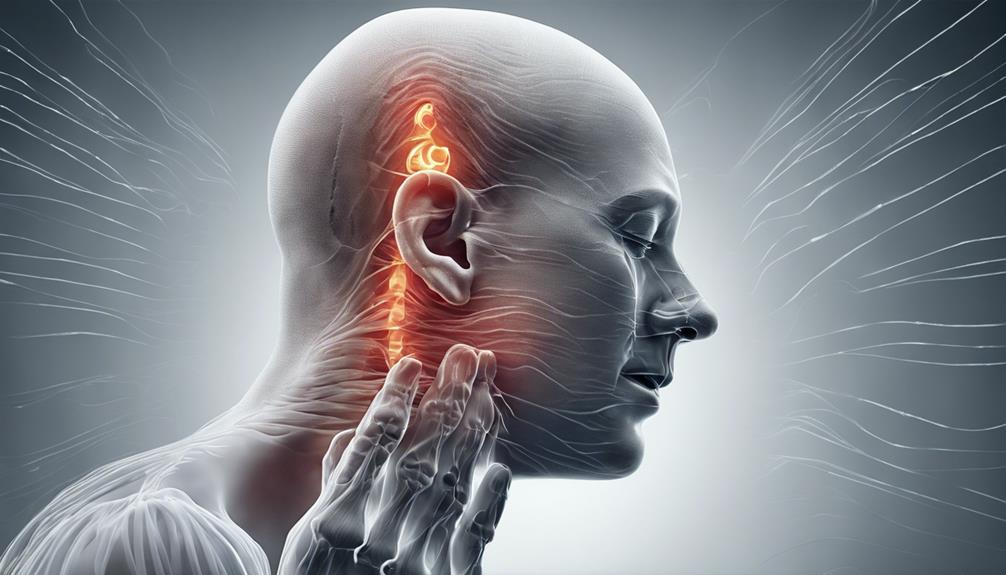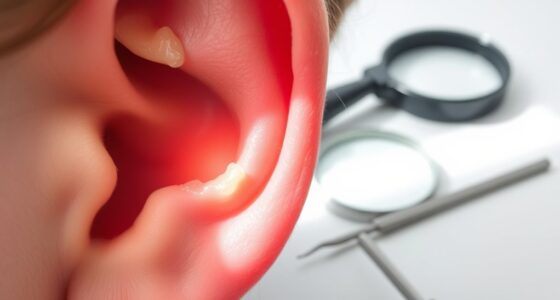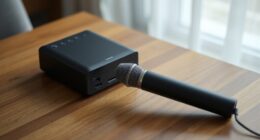While delving into the intricate pathways of the inner ear, envision a delicate balance that can be disrupted by a seemingly innocuous substance like hydrogen peroxide.
Have you ever wondered how this common household item could stealthily impact our ability to perceive sound?
Let's explore the hidden dangers lurking within the realms of ear care and unravel the intricate web of how hydrogen peroxide can insidiously lead to hearing loss.
Key Takeaways
- Excessive hydrogen peroxide damages delicate ear structures.
- Concentrations above 10% can lead to burns in the ear canal.
- Oxidative stress from hydrogen peroxide harms auditory structures.
- Immediate medical attention is crucial for hydrogen peroxide-related hearing symptoms.
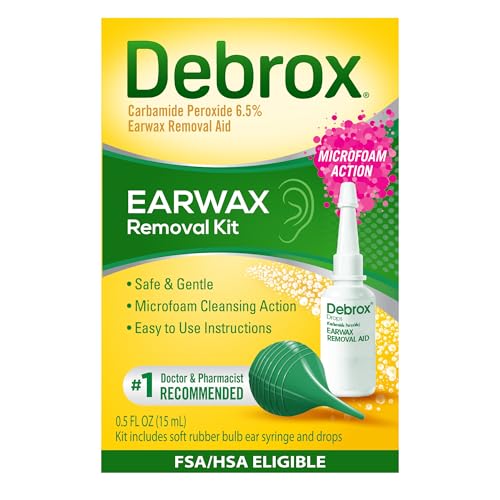
Debrox Ear Wax Removal Kit, Bulb Syringe & 0.5 Fl Oz Ear Wax Removal Drops with Carbamide Peroxide
Debrox Ear Wax Removal Drops use microfoaming action to gently soften and loosen excess ear wax, allowing it…
As an affiliate, we earn on qualifying purchases.
As an affiliate, we earn on qualifying purchases.
Understanding Hydrogen Peroxide and Ear Health
Hydrogen peroxide, when improperly used, poses a significant risk to ear health by potentially damaging delicate structures within the ear. Ear wax, a natural substance that protects the ear canal, can be affected by excessive hydrogen peroxide use. Ear irrigation with hydrogen peroxide can disrupt the normal balance of ear wax, leading to blockages or improper removal, potentially impacting hearing function.
This disruption can cause inflammation, irritation, and even earaches. Furthermore, the overuse of hydrogen peroxide, especially in concentrations exceeding 10%, may result in burns and harm to the sensitive ear canal tissues. Such damage can contribute to hearing loss by affecting the intricate mechanisms responsible for sound transmission.
Therefore, it's crucial to seek professional advice for any ear health concerns to prevent potential hearing impairment caused by the misuse of hydrogen peroxide.
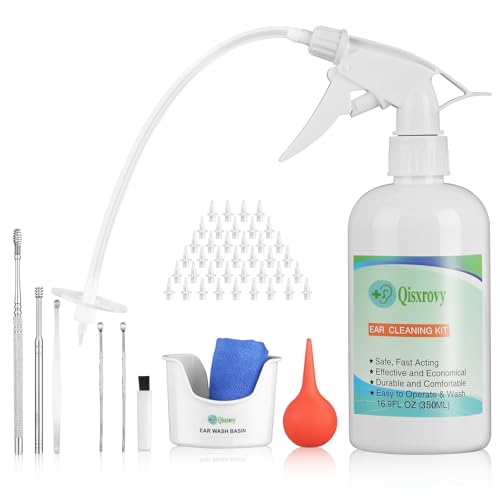
Ear Wax Removal Tool, Ear Cleaning Kits Safe Ear Irrigation Kit Ear Flush Kit for Adults Kid, Ear Wax Washer Device Easy to Operate, Includes Basin, Syringe, Curette Kit, Towel and 40 Disposable Tips
Earwax Removal System: This ear wax washer system offers a convenient ear cleaning solution for home use. Enjoy…
As an affiliate, we earn on qualifying purchases.
As an affiliate, we earn on qualifying purchases.
The Link Between Hydrogen Peroxide and Hearing Damage

When used excessively, hydrogen peroxide poses a significant risk to hearing health due to its potential to irritate and damage delicate ear structures. The concentration of hydrogen peroxide plays a crucial role in its effects on the ears, with concentrations above 10% having the potential to cause burns and skin irritation in the ear canal, which can increase the risk of hearing damage.
Additionally, overuse of hydrogen peroxide can disrupt the natural balance of earwax, leading to complications such as earaches and hearing difficulties. This disruption may also result in ear fullness, further impacting hearing and overall ear health.
It's essential to be cautious when using hydrogen peroxide for earwax removal to prevent these issues. Seeking professional guidance and considering safer alternatives for ear care can help mitigate the risks associated with improper hydrogen peroxide usage.

Debrox Ear Wax Removal Kit, Bulb Syringe & 0.5 Fl Oz Ear Wax Removal Drops with Carbamide Peroxide
Debrox Ear Wax Removal Drops use microfoaming action to gently soften and loosen excess ear wax, allowing it…
As an affiliate, we earn on qualifying purchases.
As an affiliate, we earn on qualifying purchases.
Mechanisms of Hydrogen Peroxide-Induced Hearing Loss
Excessive exposure to hydrogen peroxide in the ear canal can lead to oxidative stress in the cochlea, resulting in damage to critical auditory structures and potentially causing hearing loss. Hydrogen peroxide, a common household antiseptic, exerts its detrimental effects on hearing through the generation of reactive oxygen species.
These reactive molecules disrupt the intricate balance within the inner ear, leading to injury of delicate hair cells and auditory nerve fibers. The oxidative damage triggered by hydrogen peroxide can incite inflammation and cell death in the inner ear, further exacerbating inner ear injuries and contributing to hearing impairment.
The cytotoxic properties of hydrogen peroxide on cochlear structures can induce irreversible damage if left unchecked. By interfering with the normal physiological processes of the auditory system, hydrogen peroxide poses a significant risk for permanent hearing loss. Understanding the mechanisms underlying hydrogen peroxide-induced hearing loss is crucial for implementing timely interventions to mitigate its damaging effects on auditory function.

Peltor Sport Tri-Flange Corded Reusable Earplugs, 3 Pair, Noise Reduction Rating (NRR) 26 dB, Comfortable Fit, Ideal For Range, Shooting & Hunting, Washable and Corded, Neon Yellow (97317-10C)
26 dB Noise Reduction Rating (NRR)
As an affiliate, we earn on qualifying purchases.
As an affiliate, we earn on qualifying purchases.
Signs and Symptoms of Hearing Loss Due to Hydrogen Peroxide

Indications of potential hearing impairment resulting from exposure to hydrogen peroxide may encompass a range of recognizable signs and symptoms.
- Reduced ability to hear high-pitched sounds
- Muffled hearing
- Difficulty understanding speech
- Ringing in the ears (tinnitus)
These symptoms can be indicative of hearing loss caused by hydrogen peroxide. The delicate structures of the ear can sustain damage from prolonged exposure to high concentrations of hydrogen peroxide, leading to varying degrees of hearing impairment.
Additionally, ear pain, discharge, and vertigo may also surface as potential signs of hearing loss linked to hydrogen peroxide exposure. If you encounter any of these symptoms post hydrogen peroxide use, seeking immediate medical attention is crucial. Prompt intervention can help in mitigating further damage and improving the chances of successful treatment outcomes.
Prevention and Treatment Strategies for Hydrogen Peroxide-Related Hearing Loss
To prevent and address hydrogen peroxide-related hearing loss, it is essential to adopt appropriate measures for ear care and seek timely professional assistance. Proper ear hygiene practices, such as avoiding the use of high concentrations of hydrogen peroxide without medical supervision, can help prevent complications like ear canal burns, skin irritation, and ultimately hearing loss. If you experience any signs of discomfort, it is crucial to consult an ear specialist promptly to prevent further damage.
Prevention and Treatment Strategies for Hydrogen Peroxide-Related Hearing Loss
| Prevention Measures | Treatment Options | Professional Assistance | Additional Recommendations |
|---|---|---|---|
| Avoid excessive hydrogen peroxide use in ears | Seek medical attention if experiencing ear pain or irritation | Regular ear check-ups by an ENT specialist | Use ear drops recommended by healthcare providers |
| Practice gentle ear cleaning techniques | Use ear drops to alleviate discomfort | Immediate consultation for severe symptoms | Keep ears dry and protect them from water exposure |
| Follow recommended guidelines for earwax removal | Use warm oil to soften earwax before removal | Audiological evaluation for hearing assessment | Avoid inserting foreign objects into the ear canal |
Frequently Asked Questions
Can Hydrogen Peroxide Cause Hearing Loss?
Yes, hydrogen peroxide can cause hearing loss if used improperly. Excessive exposure to hydrogen peroxide in the ear can lead to inflammation, irritation, and damage to delicate ear structures, potentially impairing hearing function.
Prolonged use or high concentrations of hydrogen peroxide may disrupt the natural balance of earwax and increase the risk of hearing difficulties.
Seeking professional guidance for ear care is essential to prevent the potential risk of hearing loss associated with improper hydrogen peroxide use.
Is It OK to Put Hydrogen Peroxide in Your Ear for Ear Infection?
Absolutely not! Putting hydrogen peroxide in your ear for an infection isn't safe without proper guidance. It can lead to complications and damage the ear canal.
Seek advice from a healthcare professional for correct diagnosis and treatment. Avoid self-treatment with hydrogen peroxide to prevent irritation and harm.
Always prioritize your hearing health by consulting experts before attempting any ear treatments.
Is It Good to Hear Clicking After Putting Hydrogen Peroxide in Your Ear?
Yes, hearing clicking after using hydrogen peroxide in the ear can be a positive sign. The clicking indicates that the solution is working to break down and remove earwax.
This effervescent action can cause bubbling or fizzing sounds, showing that the hydrogen peroxide is interacting with the earwax.
It's essential to pay attention to any changes in sensation or discomfort and seek medical advice if needed.
How Long Does It Take for Hydrogen Peroxide to Unclog Ears?
When using hydrogen peroxide to unclog ears, the time it takes can vary based on the amount and consistency of earwax present. The bubbling action of hydrogen peroxide aids in dislodging earwax, typically facilitating its removal within 5-10 minutes.
For stubborn blockages, multiple applications over several days may be necessary for complete ear unclogging. It's important to follow proper guidelines and consult a healthcare professional if needed.
Conclusion
In conclusion, it's crucial to be cautious when using hydrogen peroxide for earwax removal to prevent potential hearing loss. Excessive use of hydrogen peroxide can lead to damage to the delicate structures of the ear, causing pain and inflammation.
Seeking professional help from a certified hearing specialist is the safest way to address earwax issues without risking your hearing health. Remember, when it comes to your ears, it's better to be safe than sorry.




